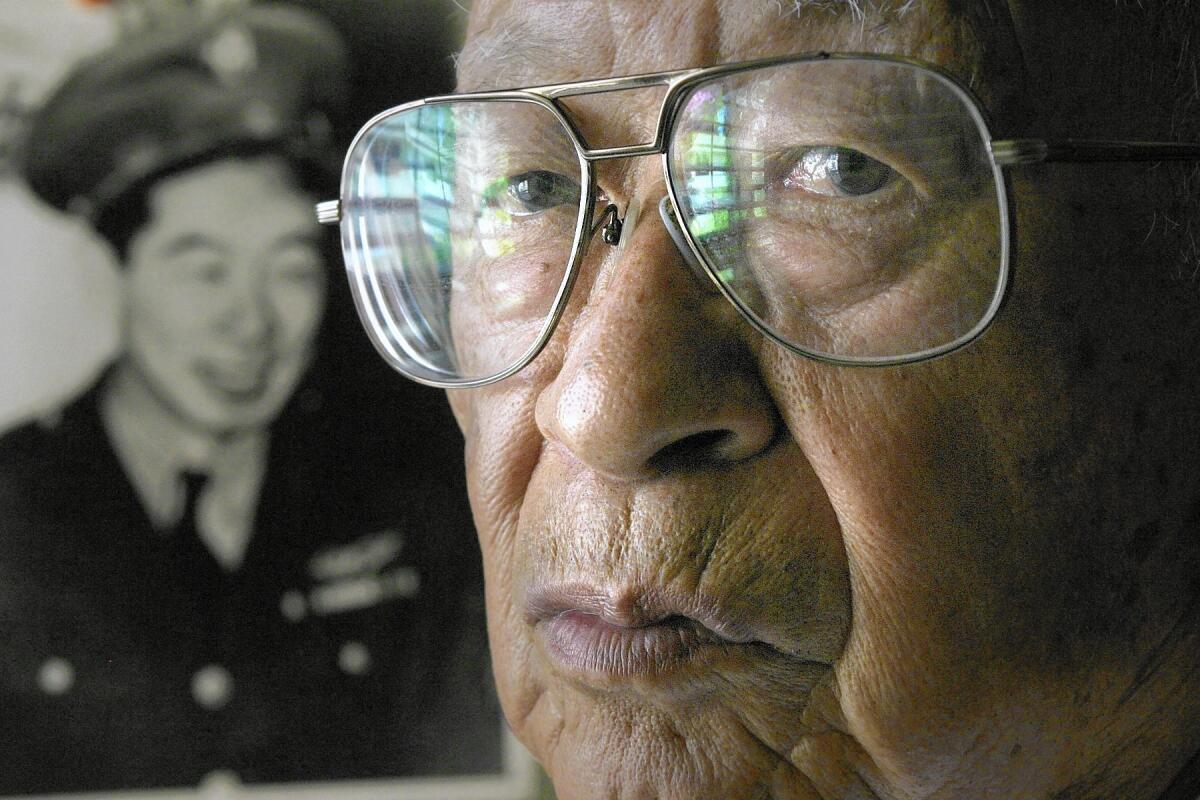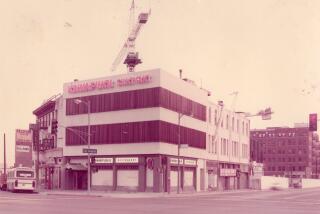Ben Kuroki dies at 98; Japanese American overcame bigotry to fly bombing raids in World War II

Ben Kuroki, a Japanese American tail gunner who overcame the American military’s discriminatory policies to fly on 58 bombing missions over three continents during World War II, including raids on Tokyo in the final months of the war, died Tuesday in Camarillo.
He was 98 and under hospice care at home, said his daughter Julie Kuroki.
Ben Kuroki was born on a potato farm near Hershey, Neb., on May 16, 1917, to Japanese-born parents. Along with his brother Fred, he sought to enlist in the U.S. Army after the attack on Pearl Harbor but was rebuffed by recruiters who questioned the loyalty of nisei, the children of Japanese immigrants. Undeterred, the brothers drove 150 miles to another recruiter, who allowed them to sign up.
He had to “fight like hell for the right to fight for my own country,” Kuroki said later.
At the time, the Army banned soldiers of Japanese descent from bomber crews, but Kuroki secured a place in the 93rd Bomb Group in 1942. The experience of being under enemy fire helped banish the sense of being an outsider. “For the first time, I belonged,” he said in a 2005 Times interview. “Thereafter, we fought as a team and as family.”
He flew dozens of missions in Europe and North Africa, taking part in raids over Nazi oil fields in Ploesti, Romania, that killed 310 fliers in his group. Once, he was captured after his plane ran out of fuel over Morocco, but he managed to escape with crewmates to England.
Fliers who survived 25 missions, as Kuroki had by the end of 1943, were permitted to go home under Army policy, but he insisted on further missions “to prove my loyalty,” he explained. On a mission over Munster, Germany, shrapnel tore through his gunner’s turret and pierced his oxygen mask, and he was saved when a crewmate gave him a spare mask.
Crew members nicknamed him “Most Honorable Son,” and the War Department gave him a Distinguished Flying Cross.
But his bravery in war did not protect him from bigotry back home. In Denver, he recalled, another serviceman refused to share a cab with him.
Seeking to capitalize on the notoriety his war record had won him, the government pressed Kuroki into service as a recruiter of Japanese Americans at internment camps across the western United States. More than 100,000 people of Japanese descent had been rounded up and confined to the camps amid fears of a Japanese invasion of the West Coast. The role of recruiter was one he found deeply uncomfortable. The men guarding the camps, he would recall, were wearing the same uniform he was.
NEWSLETTER: Get the day’s top headlines from Times Editor Davan Maharaj >>
In a February 1944 story about Kuroki in the Los Angeles Times, a writer reported, “He says he has a yearning to bomb Tokyo and has asked for reassignment to the Pacific Theater.”
In that effort, Kuroki sought the help of a Nebraska congressman, who appealed to Secretary of War Henry Stimson, who wrote personally to approve Kuroki’s participation in B-29 bombing raids over the Pacific. Kuroki was proud of the letter from Stimson and kept it framed. He flew 28 missions from a base on Tinian Island, including bombing raids over Tokyo and other Japanese cities that left extensive civilian casualties.
“It bothered me a lot — all the women and children,” he would say. “But it was war.”
Back in the barracks, a drunken serviceman called him a “damned Jap” and gashed his head with a knife, requiring 24 stitches.
After the war, Kuroki earned a journalism degree from the University of Nebraska and led a quiet life as a newspaperman, working at small papers in Nebraska, Michigan and California, including as an editor at the Ventura Star-Free Press. He retired in 1984 and played golf avidly.
In 2005, at the age of 88, he received a Distinguished Service Medal, one of the nation’s highest military honors. In 2007, he was the subject of a PBS documentary, “Most Honorable Son,” in which he said, “I hated the fact that I was born Japanese... I wanted to try to avenge what they had done.”
In addition to his daughter Julie, he is survived by his wife, Shige; daughters Kerry Williams and Kristyn Kuroki; sister Rosemary Ura; four grandchildren, and one great-grandchild.
ALSO
Hammerhead shark bites kayaker’s leg near Malibu
Bomb threat at LAX turns out to be false alarm
Why those working-age men who left the U.S. job market aren’t coming back
More to Read
Start your day right
Sign up for Essential California for the L.A. Times biggest news, features and recommendations in your inbox six days a week.
You may occasionally receive promotional content from the Los Angeles Times.







